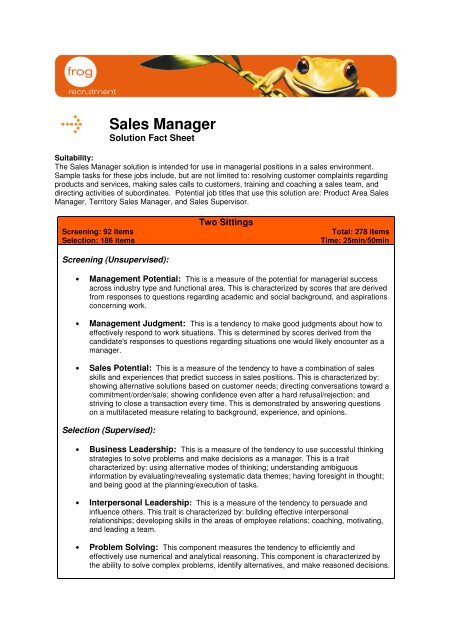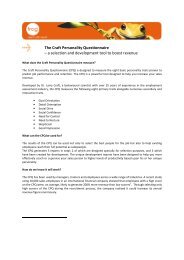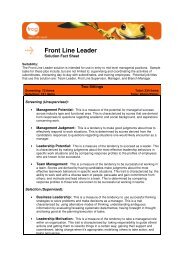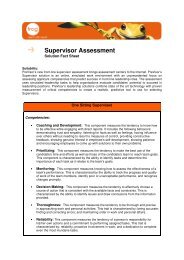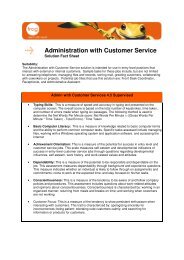Sales Manager - Frog Recruitment
Sales Manager - Frog Recruitment
Sales Manager - Frog Recruitment
Create successful ePaper yourself
Turn your PDF publications into a flip-book with our unique Google optimized e-Paper software.
<strong>Sales</strong> <strong>Manager</strong><br />
Solution Fact Sheet<br />
Suitability:<br />
The <strong>Sales</strong> <strong>Manager</strong> solution is intended for use in managerial positions in a sales environment.<br />
Sample tasks for these jobs include, but are not limited to: resolving customer complaints regarding<br />
products and services, making sales calls to customers, training and coaching a sales team, and<br />
directing activities of subordinates. Potential job titles that use this solution are: Product Area <strong>Sales</strong><br />
<strong>Manager</strong>, Territory <strong>Sales</strong> <strong>Manager</strong>, and <strong>Sales</strong> Supervisor.<br />
Two Sittings<br />
Screening: 92 items Total: 278 items<br />
Selection: 186 items Time: 25min/50min<br />
Screening (Unsupervised):<br />
• Management Potential: This is a measure of the potential for managerial success<br />
across industry type and functional area. This is characterized by scores that are derived<br />
from responses to questions regarding academic and social background, and aspirations<br />
concerning work.<br />
• Management Judgment: This is a tendency to make good judgments about how to<br />
effectively respond to work situations. This is determined by scores derived from the<br />
candidate's responses to questions regarding situations one would likely encounter as a<br />
manager.<br />
• <strong>Sales</strong> Potential: This is a measure of the tendency to have a combination of sales<br />
skills and experiences that predict success in sales positions. This is characterized by:<br />
showing alternative solutions based on customer needs; directing conversations toward a<br />
commitment/order/sale; showing confidence even after a hard refusal/rejection; and<br />
striving to close a transaction every time. This is demonstrated by answering questions<br />
on a multifaceted measure relating to background, experience, and opinions.<br />
Selection (Supervised):<br />
• Business Leadership: This is a measure of the tendency to use successful thinking<br />
strategies to solve problems and make decisions as a manager. This is a trait<br />
characterized by: using alternative modes of thinking; understanding ambiguous<br />
information by evaluating/revealing systematic data themes; having foresight in thought;<br />
and being good at the planning/execution of tasks.<br />
• Interpersonal Leadership: This is a measure of the tendency to persuade and<br />
influence others. This trait is characterized by: building effective interpersonal<br />
relationships; developing skills in the areas of employee relations; coaching, motivating,<br />
and leading a team.<br />
• Problem Solving: This component measures the tendency to efficiently and<br />
effectively use numerical and analytical reasoning. This component is characterized by<br />
the ability to solve complex problems, identify alternatives, and make reasoned decisions.
• Verbal Reasoning: This is a measure of the ability to efficiently and effectively use<br />
verbal reasoning. This trait is characterized by the ability to verbally explain complex<br />
information to others; the ability to understand complex relationships; and the ability to<br />
utilize a broad vocabulary.<br />
• <strong>Sales</strong> Drive: This is a measure of the tendency to possess personal characteristics<br />
such as goal orientation, persistence, dominance, drive, and energy. This suggests the<br />
likelihood of success in an intermediate level sales environment. This trait is<br />
characterized by: focusing effort to achieve or exceed sales quotas; working to find<br />
connections between the company's products and the customer's needs; directing<br />
conversation toward a commitment or sale; showing confidence even after a hard<br />
refusal/rejection; and striving to close a transaction every time.<br />
• Confidence and Independence: This is a measure of the tendency to be<br />
comfortable and confident in situations that require one to work autonomously, especially<br />
in an intermediate level sales environment. This trait is characterized by: confidence<br />
when approaching potential customers; enjoying the challenge of influencing others; and<br />
persuading prospective customers to commit to a purchase.<br />
Sample Questions:<br />
• Of the following, the most important objective a supervisor can work toward is:<br />
o to avoid any major disputes or conflicts<br />
o to be successful without anyone else's help<br />
o to continually provide a lot of new ideas<br />
o to get employees to work smoothly together<br />
o to have the courage to question organization decisions which are unwise<br />
• I am good at motivating people around a common cause.<br />
o Strongly Disagree – Strongly Agree<br />
• I stay calm and relaxed, even when deadlines approach.<br />
o Strongly Disagree – Strongly Agree<br />
• Of the following statements, the one which describes me best is:<br />
o I work best when my instructions are clear<br />
o I work best when there are no interruptions<br />
o I work best when I'm in the mood<br />
o I work best when I'm working alone<br />
o I work best under pressure<br />
One Sitting Unsupervised<br />
Number of Items: 162 items Time: 35min<br />
Competencies:<br />
• Management Potential: This is a measure of the potential for managerial success<br />
across industry type and functional area. This is characterized by scores that are derived<br />
from responses to questions regarding academic and social background, and aspirations<br />
concerning work.<br />
• Management Judgment: This is a tendency to make good judgments about how to<br />
effectively respond to work situations. This is determined by scores derived from the
candidate's responses to questions regarding situations one would likely encounter as a<br />
manager.<br />
• <strong>Sales</strong> Potential: This is a measure of the tendency to have a combination of sales<br />
skills and experiences that predict success in sales positions. This is characterized by:<br />
showing alternative solutions based on customer needs; directing conversations toward a<br />
commitment/order/sale; showing confidence even after a hard refusal/rejection; and<br />
striving to close a transaction every time. This is demonstrated by answering questions<br />
on a multifaceted measure relating to background, experience, and opinions.<br />
• <strong>Sales</strong> Drive: This is a measure of the tendency to possess personal characteristics<br />
such as goal orientation, persistence, dominance, drive, and energy. This suggests the<br />
likelihood of success in an intermediate level sales environment. This trait is<br />
characterized by: focusing effort to achieve or exceed sales quotas; working to find<br />
connections between the company's products and the customer's needs; directing<br />
conversation toward a commitment or sale; showing confidence even after a hard<br />
refusal/rejection; and striving to close a transaction every time.<br />
• Confidence and Independence: This is a measure of the tendency to be<br />
comfortable and confident in situations that require one to work autonomously, especially<br />
in an intermediate level sales environment. This trait is characterized by: confidence<br />
when approaching potential customers; enjoying the challenge of influencing others; and<br />
persuading prospective customers to commit to a purchase.<br />
Sample Questions:<br />
• Of the following, the one thing which is most necessary to supervisory success is:<br />
o an ability to keep track of detail<br />
o an ability to listen<br />
o an ability to be consistent<br />
o an ability to be patient<br />
o an ability to understand how other people feel<br />
• During a routine follow-up call, your customer confronts you by saying, "I just found out that<br />
one of our competitors across town is paying substantially less for your products than I am,<br />
and I buy twice as much! What's going on here?" You would:<br />
o Tell him "I'm not totally prepared to discuss the specifics of your prices versus<br />
your competitor's prices today, but I understand your concern and I'll look into it<br />
immediately."<br />
o Tell him, "That's totally false; I'm sure you've been given some incorrect<br />
information."<br />
o apologize and offer to lower the prices immediately<br />
o offer to discuss his concerns at your next meeting with him<br />
o explain that his purchase volume has declined over the past year, so he is not<br />
buying any more product than his competition<br />
• I like to make sure that action is taken quickly to resolve a problem.<br />
o Strongly Disagree – Strongly Agree<br />
• Concerning your present and future activities, do you:<br />
o make rather precise and detailed plans<br />
o make broad and general plans, but not detailed ones<br />
o make few plans, let nature take its course
One Sitting Supervised<br />
Number of Items: 194 items Time: 60min<br />
Competencies:<br />
• Management Potential: This is a measure of the potential for managerial success<br />
across industry type and functional area. This is characterized by scores that are derived<br />
from responses to questions regarding academic and social background, and aspirations<br />
concerning work.<br />
• Management Judgment: This is a tendency to make good judgments about how to<br />
effectively respond to work situations. This is determined by scores derived from the<br />
candidate's responses to questions regarding situations one would likely encounter as a<br />
manager.<br />
• <strong>Sales</strong> Potential: This is a measure of the tendency to have a combination of sales<br />
skills and experiences that predict success in sales positions. This is characterized by:<br />
showing alternative solutions based on customer needs; directing conversations toward a<br />
commitment/order/sale; showing confidence even after a hard refusal/rejection; and<br />
striving to close a transaction every time. This is demonstrated by answering questions<br />
on a multifaceted measure relating to background, experience, and opinions.<br />
• Problem Solving: This component measures the tendency to efficiently and<br />
effectively use numerical and analytical reasoning. This component is characterized by<br />
the ability to solve complex problems, identify alternatives, and make reasoned decisions.<br />
• Verbal Reasoning: This is a measure of the ability to efficiently and effectively use<br />
verbal reasoning. This trait is characterized by the ability to verbally explain complex<br />
information to others; the ability to understand complex relationships; and the ability to<br />
utilize a broad vocabulary.<br />
• <strong>Sales</strong> Drive: This is a measure of the tendency to possess personal characteristics<br />
such as goal orientation, persistence, dominance, drive, and energy. This suggests the<br />
likelihood of success in an intermediate level sales environment. This trait is<br />
characterized by: focusing effort to achieve or exceed sales quotas; working to find<br />
connections between the company's products and the customer's needs; directing<br />
conversation toward a commitment or sale; showing confidence even after a hard<br />
refusal/rejection; and striving to close a transaction every time.<br />
• Confidence and Independence: This is a measure of the tendency to be<br />
comfortable and confident in situations that require one to work autonomously, especially<br />
in an intermediate level sales environment. This trait is characterized by: confidence<br />
when approaching potential customers; enjoying the challenge of influencing others; and<br />
persuading prospective customers to commit to a purchase.<br />
Sample Questions:<br />
• Supervisors who find that their employees' understanding of an organization rule is different<br />
from their own should first:<br />
o call a meeting of the employees to discuss the rule and its meanings<br />
o request a more detailed explanation from their superior<br />
o review the rule again themselves to be certain that their employees are wrong<br />
o call a meeting of all concerned to explain the way the rule should be interpreted<br />
o ask other supervisors for their opinions
• How self-confident are you about your intellectual and social abilities?<br />
o lack some self-confidence in both your intellectual and social abilities<br />
o have quite a bit of self-confidence about your social ability, but are not as selfconfident<br />
about your intellectual ability<br />
o have quite a bit of self-confidence about your intellectual ability, but are not as<br />
self-confident about your social abilities<br />
o quite confident about both<br />
o very confident about both<br />
• When you ask people I've worked with about my ability to stay calm and collected, no<br />
matter the situation, they would rate me as:<br />
o Excellent<br />
o Very good<br />
o Good<br />
o Fair<br />
o Poor<br />
o I don't know how he or she would rate me<br />
• When working in a group, I tend to listen to the ideas of others before suggesting a course<br />
of action.<br />
o Strongly Disagree – Strongly Agree


